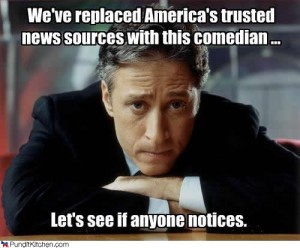Why we trust who we do fascinates me. With so many information sources available, what makes anything, even broadcast or cable news, stand out?
Jon Klein says viewers trust sources, usually networks, that presents news in a way that agrees with its political ideology. Regardless of fact, as long as new sources live up to their market positioning, viewers will see it as truth. This scares the hell out of me.
I’m not sure how to fix it. Is the model itself broken? While TV has been able to adapt much faster than print in a ongoing effort to be relevant, surely the idea that truth and fact, regardless of political ideology, exists somewhere out there must have news organizations and the people that work with them more than a little worried.
 There are answers out there, but I’m not sure they are good ones. Wikileaks, whether anyone agrees with their blanket approach of releasing everything they find (I don’t agree with this particular approach), may become the new normal when it comes to news gathering. Information is released, someone puts it ALL online, reputable news organizations, whether print, digital or TV, repackage and republish it in a way that aligns with their current positioning.
There are answers out there, but I’m not sure they are good ones. Wikileaks, whether anyone agrees with their blanket approach of releasing everything they find (I don’t agree with this particular approach), may become the new normal when it comes to news gathering. Information is released, someone puts it ALL online, reputable news organizations, whether print, digital or TV, repackage and republish it in a way that aligns with their current positioning.
But does that elicit any more trust than Wikileaks? Where do the aggregators, the PR practitioners and the other media-savvy professionals fit in here? Certainly they don’t agree or like the Wikileaks model, but I’m not sure anyone has figured where a proper filter or lens fits in in this process.
When the way we received news change, people adapted. When the way people interacted with news changed, we all adapted, or are still adapting, to that, too. Now that the way news breaks is changing, how we will the information industry adapt to properly frame and present what’s happening?
They’ll have to stay true to who they are.
“People’s trust in journalism has always been about branding” – Vint Cerf, Chief Evangelist at Google
